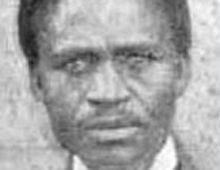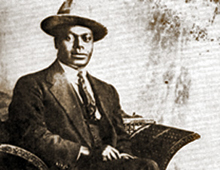1867 to 1947
Pioneers
About this page
Legacy noun leg·a·cy \ˈle-gə-sē\ – something transmitted by or received from an ancestor or predecessor or from the past Word Origin: from Medieval Latin lēgātia commission
– Oxford Dictionary
The Pioneers, has been running since 2014 with the principle aim of unearthing the history buried away by the erstwhile apartheid, in a bid to obliterate the legacy built by Africans, particularly in the literary world. Since its launch the Pioneers section has recorded and brought to light the Black Press players of the 1800s. Influenced by the missionary colonial education, the era produced giants such as Tiyo Soga, the first black literary figure, co-translator of the Bible and Pilgrim’s Progress into Xhosa.
Demonstrated impact made by Independent Black Newspaper proprietors 1884-1932, was recorded through John Tengo Jabavu’s Imvo Zabantsundu , Allan Kirkland Soga and Walter Rubusana’s Izwi Labantu. While there were many Tswana publications prior to Solomon T Plaatje and Silas Molema’s it was the duo’s purchase of Koranta ea Becoana, a Tswana/English newspaper from George Nathaniel Henry Whale in 1901, that would be the first ‘native owned ’ Tswana paper.
Basotho, produced a treasure in H S Tlale who played a major role in founding the first Sotho newspaper Mochochono (The Comet) in Basutoland, now known as Lesotho, in 1911. When the Columbia and Oxford Universities educated Pixley Ka Izaka Seme and three other lawyers – Alfred Mandena, R.W. Msimang and G.D Montsioa – founded the African National Congress (ANC), he conceived the idea of establishing a newspaper that could be used as a mouthpiece of the organisation. Abantu-Batho was launched in 1913, a merger between Molomo Oa Batho and Morumia, with C Kunene as English and Zulu editor and D S Lentaka as Sotho editor.
These are but a few pioneers of the 62 we have covered to date who form the wealth of the legacy built by these incredible individuals who have bequeathed worthy history to etch in the hearts and minds of generations to come. As we continue the journey through different eras, we endeavor to keep a promise and a commitment to publish quality stories about men and women who have contributed to the development of our society, as a way to preserving their legacy and recording the history that would have otherwise died along with their spirits.
This section will continue to search for these pioneers and bring them to the fore. Bantu Press Pty Ltd era that sought to commercialise black media consumption, introducing the Bantu World will also be looked into. While we have covered some of the Pioneers referred to, be assured that we will examine the commercialisation era, the Drum era and women Pioneers. This journey is nowhere near over.
Levi Khomo
Creating space for African views
Cleopas Solomon Mabaso
A key political broker
T.D. Mweli-Skota
African Human Encyclopaedia
Jeremiah Dunjwa
Distinguished writer and historian
Sefako Mapogo Makgatho
1861 – 1951
“We ask for no special favours….”
Simon Majakathata Phamotse
Prominent Sotho literary giant
RV Selope Thema
1886 – 1955
Most influential figure in ANCs infancy
Cleopas Kunene: A man with no borders
1866 – 1917
Nathaniel Cyril Umhalla
An Anglicised African Ranji
Thomas Levi Mvabaza: 1880 to 1955
Uncompromisingly Radical
Reverend Dr James Stewart
1831 to 1905
A man of many trades
Godfrey Rosenbaum Zibuse Peteni Kuzwayo
1909 – 1965
An businessman and entertainment writer of note
George Greig: An enterprising publisher
Thapelo Mokoatsi George Greig was an ambitious enterprising young man. He was only 23 when he first arrived in the Cape Colony from Scotland, set up shop and appropriated profits to support his business venture as a publisher. He was described as a man without reforming zeal, and liberal spirit such as that of fellow […]
Saul Msane
A robust writer and chess boffin
Elijah Makiwane
A proud Mfengu that advanced African Feminism
Joseph Suasso de Lima
Many things to many people: Father of Dutch Journalism in South Africa
Daniel Simon Letanka
A protest journalist
Robert Grendon
The eccentric, forthright and controversial intellectual
Mark Radebe
Preserving the Zulu Language
Pixley ka Isaka Seme
A strong advocate for justice and a shared identity
Pringle and Fairbairn
Early free press advocates
Alfred Mangena
As an African intellectual whose political awareness was raised by the Bambatha Rebellion, he created the historical content of the New African Movement
Allan Kirkland Soga
Early advocate of African protest journalism

About Us
The Journalist is a ground-breaking media project that provides history and context for key issues facing South African journalists. The Journalist is an independent, not for profit organisation working with the academic community and a range of credible online entities to make knowledge more accessible to the wider public. We don’t only tell you what happened. We help you understand why.
Our Partners
Republish Articles
We want our stories spread far and wide. Feel free to republish our articles, but please credit our writers and authors and credit The Journalist at the top or bottom of the article complete with a hyperlink back to the site.
Donate
The Journalist is a non-profit organisation and relies on public funding. Please consider donating to ensure more issues in the future.
Account name: The Journalist / Bank: Standard Bank
Branch Code: 026209 / Account number: 270320830


























